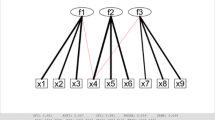Abstract
In the applications of maximum likelihood factor analysis the occurrence of boundary minima instead of proper minima is no exception at all. In the past the causes of such improper solutions could not be detected. This was impossible because the matrices containing the parameters of the factor analysis model were kept positive definite. By dropping these constraints, it becomes possible to distinguish between the different causes of improper solutions. In this paper some of the most important causes are discussed and illustrated by means of artificial and empirical data.
Similar content being viewed by others
Reference Notes
Driel, O. P. van.Description of the MALIFA (maximim likelihood factor analysis) program. (Nat. Lab. Computer Note 1975/1). Eindhoven: Philips Research Laboratories, 1975.
Mattsson, A., Olsson, U. & Rosén, M.The maximum likelihood method in factor analysis with special consideration to the problem of improper solutions. (Res. Rep.). Sweden: University of Uppsala, Institute of Statistics, 1966.
Veltkamp, G. W. Private communication, 1972.
References
Anderson, T. W. & Rubin, H. Statistical inference in factor analysis.Proceedings of the Third Berkeley Symposium on Mathematical Statistics and Probability, 1956,5, 111–150.
Bechtoldt, H. P. An empirical study of the factor analysis stability hypothesis.Psychometrika, 1961,26, 405–432.
Derflinger, G. Neue Iterationsverfahren in der Faktorenanalyse,Biometrische Zeitschrift, 1968,10, 58–75.
Derflinger, G. Efficient methods for obtaining the minres and maximum-likelihood solutions in factor analysis.Metrika, 1969,14, 214–231.
Driel, O. P. van, Prins, H. J. & Veltkamp, G. W. Estimating the parameters of the factor analysis model without the usual constraints of positive definiteness.Proceedings of the Symposium on Computational Statistics (COMPSTAT), Vienna, 1974, 255–265.
Harman, H. H.Modern factor analysis. Chicago: Univ. of Chicago Press, 1971.
Heywood, H. B. On finite sequences of real numbers.Proceedings of the Royal Society, London, 1931,134, 486–501.
Jennrich, R. I. Simplified formulae for standard errors in maximum likelihood factor analysis.British Journal of Mathematical and Statistical Psychology, 1974,27, 122–131.
Jennrich, R. I. & Ronbinson, S. M. A Newton-Raphson algorithm for maximum likelihood factor analysis.Psychometrika, 1969,34, 111–123.
Jöreskog, K. G. Some contributions to maximum likelihood factor analysis.Psychometrika, 1967,32, 443–482.
Jöreskog, K. G. & Goldberger, A. S. Factor analysis by generalized least squares.Psychometrika, 1972,37, 243–260.
Lawley, D. N. & Maxwell, A. E.Factor analysis as a statistical method. London: Butterworths, 1971.
Marcus, M. & Minc, H.A survey of matrix theory and matrix inequalities. Boston: Prindle, Weber and Schmidt, 1964.
Thurstone, L. L. & Thurstone, T. G. Factorial studies of intelligence.Psychometric Monographs, 1941,2.
Tumura, Y., Fukutomi, K. and Asoo, Y. On the unique convergence of iterative procedures in factor analysis.TRU Mathematics, 1968,4, 52–59.
Author information
Authors and Affiliations
Additional information
The author is indebted to H. J. Prins for stimulating and encouraging discussions.
Rights and permissions
About this article
Cite this article
van Driel, O.P. On various causes of improper solutions in maximum likelihood factor analysis. Psychometrika 43, 225–243 (1978). https://doi.org/10.1007/BF02293865
Received:
Revised:
Issue Date:
DOI: https://doi.org/10.1007/BF02293865




